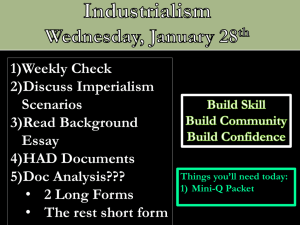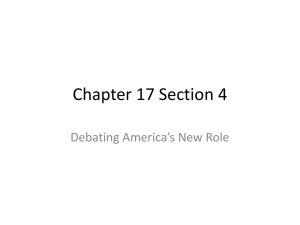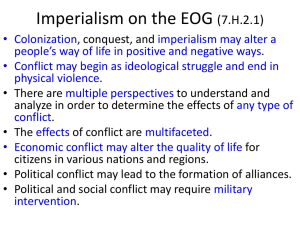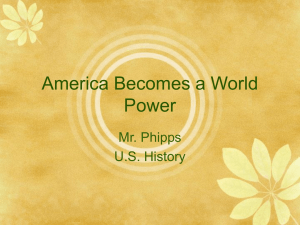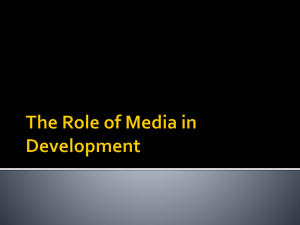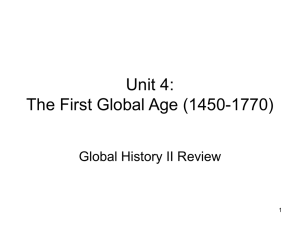File
advertisement
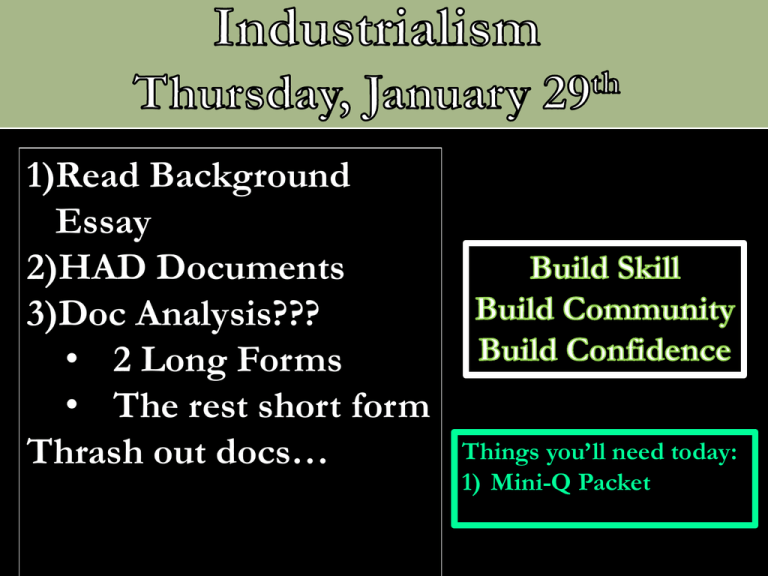
1)Read Background Essay 2)HAD Documents 3)Doc Analysis??? • 2 Long Forms • The rest short form Thrash out docs… Things you’ll need today: 1) Mini-Q Packet Date Points Title Description of historical content and type of work 1) 1-26 10 Notes form for movie 2) 1-27 40 Guns, Germs, and Steel Imperialism Mini-Q Packet 3) 1-29 10 Document Analysis Forms 2 Long Forms, 5 short forms 4) 5) 6) 7) 8) 9) Done throughout the week 1-27 = Scenarios and Essay, HW: HAD Docs DOCUMENT A ANALYSIS QUESTIONS 1. 2. 3. 4. 5. How many European countries held African colonies in 1914? Which two European countries were the biggest winners in the race to seize African colonies? How would you describe the location of each country’s colonies? Britain had a dream of building a railroad from the Mediterranean Sea to South Africa (from Cairo to Cape Town). Which country was in the strongest position to block this from happening? By 1885, what were the only two African countries to remain independent? How could this document be used to explain a driving force behind European imperialism in Africa? DOCUMENT B ANALYSIS QUESTIONS 1. What does Ruskin say England must do to again be “a source of light, a center of peace”? 2. What does he say should be the colonists’ “first aim”? 3. According to Fabri, what were Germany’s strengths when it was at the peak of all the states of Europe? 4. Why does Fabri believe that Germany needs to “strive after” colonies? 5. What is the driving force behind European imperialism in Africa, according to these two sources? DOCUMENT C ANALYSIS QUESTIONS 1. During which century was most technology in this chart? 2. Which technological advancement cured a tropical disease? Which of the technological developments gave European armies an advantage over African armies? 3. Which of the inventions do you think would have been the most important for spreading European influence in Africa? 4. How could this document be used to explain an important primary cause of European imperialism in Africa? 5. Was technology a better driving force behind European imperialism in Africa than national competition? Explain. DOCUMENT D ANALYSIS QUESTIONS 1. What European industries benefited from African resources? 2. If you owned a textile mill, which colony or colonies would you want your country to rule? 3. The Age of Imperialism fell right on the coattails of the Industrial Revolution. What is the connection between the two? 4. How could this document be used to explain the primary cause of European imperialism in Africa? DOCUMENT E ANALYSIS QUESTIONS 1. How much money did Great Britain make from exports to South Saharan Africa in 1854? In 1900? 2. Describe the difference between Great Britain’s imports from and exports to Africa in 1854 and 1900. Which experiences a higher rate by 1900? 3. According to the chart, how was Great Britain benefiting from its African colonies? 4. How could this document be used to explain an important cause of European imperialism in Africa? 5. Were economic factors more of a driving force behind European imperialism than national pride? Than improved technology? DOCUMENT F ANALYSIS QUESTIONS 1. Who is Kipling talking to when he says, “Send forth the best ye breed”? 2. Who does Kipling mean when he refers to “Your new-caught sullen people, Half-devil and half-child? 3. What does Kipling mean when he commands, “fill full the mouth of Famine, and bid the sickness cease?” 4. What is the meaning of the title “The White Man’s Burden”? 5. How can this document be used to explain the primary cause of European imperialism in Africa? 6. Are cultural attitudes a more important driving force behind European imperialism than technological or economic reasons? Explain. Document A Analysis Questions 1. How many European countries held African colonies in 1914? 2. Which two European countries were the biggest winners in the race to seize African colonies? How would you describe the location of each country’s colonies? 3. Britain had a dream of building a railroad from the Mediterranean Sea to South Africa (from Cairo to Cape Town). Which country was in the strongest position to block this from happening? 4. By 1885, what were the only two African countries to remain independent? 5. How could this document be used to explain a driving force behind European imperialism in Africa? Document B Analysis Questions 1. What does Ruskin say England must do to again be “a source of light, a center of peace”? 2. What does he say should be the colonists’ “first aim”? 3. According to Fabri, what were Germany’s strengths when it was at the peak of all the states of Europe? 4. Why does Fabri believe that Germany needs to “strive after” colonies? 5. What is the driving force behind European imperialism in Africa, according to these two sources? Document c Analysis Questions 1. During which century was most technology in this chart? 2. Which technological advancement cured a tropical disease? Which of the technological developments gave European armies an advantage over African armies? 3. Which of the inventions do you think would have been the most important for spreading European influence in Africa? 4. How could this document be used to explain an important primary cause of European imperialism in Africa? 5. Was technology a better driving force behind European imperialism in Africa than national competition? Explain. Document d Analysis Questions 1. What European industries benefited from African resources? 2. If you owned a textile mill, which colony or colonies would you want your country to rule? 3. The Age of Imperialism fell right on the coattails of the Industrial Revolution. What is the connection between the two? 4. How could this document be used to explain the primary cause of European imperialism in Africa? Document E Analysis Questions 1. How much money did Great Britain make from exports to South Saharan Africa in 1854? In 1900? 2. Describe the difference between Great Britain’s imports from and exports to Africa in 1854 and 1900. Which experiences a higher rate by 1900? 3. According to the chart, how was Great Britain benefiting from its African colonies? 4. How could this document be used to explain an important cause of European imperialism in Africa? 5. Were economic factors more of a driving force behind European imperialism than national pride? Than improved technology? Document F Analysis Questions 1. Who is Kipling talking to when he says, “Send forth the best ye breed”? 2. Who does Kipling mean when he refers to “Your new-caught sullen people, Half-devil and half-child? 3. What does Kipling mean when he commands, “fill full the mouth of Famine, and bid the sickness cease?” 4. What is the meaning of the title “The White Man’s Burden”? 5. How can this document be used to explain the primary cause of European imperialism in Africa? 6. Are cultural attitudes a more important driving force behind European imperialism than technological or economic reasons? Explain. THE WORLD DURING THE LAST 250 YEARS
